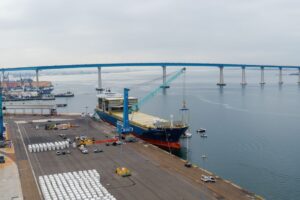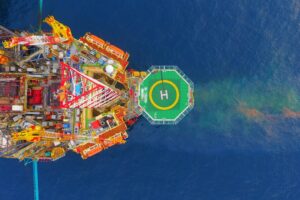Overseeing the regulation of the entire port sector of Mauritius and its surrounding islands, the Mauritius Port Authority has committed to an enormous roster of responsibilities and there is no sign of struggle.
Founded in 1976, the then Mauritius Marine Authority strode into new territory with confidence, identifying those areas which needed the most regulation, guidance and management. The result of such a hands-on approach lead to the authority being renamed as the Mauritius Ports Authority (MPA) in 1998, under a revised Ports Act. The name also made more sense, given that the authority is not just an overseeing body, it is also intrinsically woven into the fabric of the marine sector,
“The MPA is a landlord port authority, providing the main port infrastructure and superstructure, together with related facilities. It also provides marine services and navigation aids, while it regulates and controls all port activities and environmental issues within the designated port areas.”
When your own success is dependent on that of another enterprise, collaborative working practices and symbiotic relationships are essential, so this arrangement is genius at its very core. Add in the crucial nature of a slick ports sector for the good of the wider economy and there can be no doubting what a critical role the MPA plays.
Being an island, Mauritius is entirely dependent on the seamless and uninterrupted flow of goods both in and out. An efficient import and export industry allows for internal commercial growth and increased interest from overseas operations looking to supply new products to certain locations. It’s a win-win, but when ports are not run with the requisite expediency, problems start to back up. This has never been an issue for the MPA because it retains a focus on the driving forces behind its inception,
“As the principal gateway of the country, Port Louis Harbour plays a vital role in the national economy by handling about 99% of the total volume of the external trade. All strategic imports such as food and petroleum products, raw materials for the textile industry, and major exports such as sugar and textile, transit through the harbour.”
Working to a stringent set of strategic objectives, all geared towards the provision of world-class services, facilities and equipment, the MPA has been rigorous in its constant improvements. Where lesser authorities might have simply sought to maintain the status quo, the MPA has been determined to be recognised as a force for positive and definitive change. The result of this is an ‘economic nerve centre’ filled with contemporary equipment, highly expert staff, a spectacular Freeport and even a stunning waterfront, complete with specialist cruise ship facilities.
By recognising the industries and individuals that support Mauritius, the MPA has been able to position itself in the role of unofficial ambassador to the outside world and it’s a strategy that is yielding phenomenal results,
“The strategic objective of the MPA is to make Port Louis and Port Mathurin Harbours well equipped, professionally managed and constantly upgraded ports in order to maintain high productivity and enhanced service levels at competitive rates. To achieve this objective, MPA will continue to pursue a policy of improvement and opening to the outside world. In the same manner, it will encourage further investment in the ports to respond to the growing needs of the shipping lines and other port stakeholders.”
The Port Louis Harbour in Mauritius has undergone a huge amount of change in the years that it has been utilised as an import and export centre. The 1970s, in particular, were a dark time for the commercial centre, as outdated equipment, barely-there infrastructure and fractious relationships translated into a completely ineffectual port. Fortunately, an appraisal by the World Bank revealed untold potential and promise for Mauritius as a whole, if only the port could be modernised, which it was through the financing of a significant reconstruction and development programme.
Significant improvement of the port turned out to be the revitalisation that the entire country needed and as such, the port has remained a focus for continued development ever since,
“While Port Louis continues to be the business and administrative capital of Mauritius, expansion of the tourism industry in the late 1990s led to considerable development in Port Louis, with many shops, hotels, and restaurants being built in the Caudan Waterfront area.”
Now, all eyes are focused on the future of the port, thanks to a development schedule that is set to complete in 2040. The Port Master Plan has been revised, to now include a rationalised layout that is responsive to the trade patterns being witnessed, in a bid to secure the port’s position as one of the finest and most efficient in the Indian Ocean and there is no concern that it won’t be successful. By observing trends, the MPA has always been able to stay on top of what the port and Mauritius itself needs, moving quickly to accommodate and that includes environmental concerns.
With a master plan in place to build upon the already fantastic reputation and operational excellence of the MPA, it stands to reason that thoughts will turn to the greener side of things. All businesses, regardless of industry, have a responsibility to try and identify more environmentally friendly ways to operate and the MPA is not shirking its duties in this regard,
“The Mauritius Ports Authority (MPA) recognises the need to conduct port activities in a sustainable and climate friendly manner. In this context the MPA has embarked on the implementation of the Green Port Concept with the objective to reduce the negative impacts of port activities on the environment. The overall rationale of this project is linked to the very high dependence of Mauritius on imported fossil fuels, coupled with the high volatility and increasing cost of fuel prices, making energy security of strategic importance for the island.”
From humble and disorganised beginnings, a laudable authority has been created, with a slick and respected trade industry being the observable result. Mauritius is flourishing, thanks to the continued development and evolution of the ports and now that greener initiatives ae being introduced, there’s every chance that the MPA will be setting the example for the rest of the world’s port authorities.








